A country is only as great as its people, and in India whose populace is largely the youth, the mantle of greatness rests on young shoulders. The JEB 2014 team found shoulders that are strong, sturdy and inspiring; the nation is in good hands
“Youth is wasted on the young,” Oscar Wilde is famously quoted as saying. We disagree. And we’re here to tell you why. We might be wild. We might be reckless. But do not assume for a moment that we are irresponsible. We take ourselves seriously. We take our country seriously. We are driven by passion. We are tempered by empathy.
These were the kind of people we set out to look for when trying to identify the unsung heroes of India. We are told repeatedly by the media to look up to celebrities and stars as our youth icons, but we are never asked who are the kind of people we are actually inspired by. In these pages we tell you that we are not swayed by good looks or stardom. For us, truly actions speak louder than words – actions that have life-changing consequences for us and those around us.
Finding rising stars among us wasn’t as tedious a task as we thought it would be. The young in our country are keeping busy. From business to education to sports, they are doing it all. They aren’t afraid of a challenge; on the contrary, they look forward to breaking roadblocks. They might be local, some even small-scale in their efforts, but they are contributing to the country in their own way when so many of us are more preoccupied with relatively trivial things like our smartphone, selfies and social media statuses. These youth icons have made quantum leaps. These are the rising stars of India.
 Your Friendly Neighbourhood Grocer
Your Friendly Neighbourhood Grocer
In a mere two years Localbanya.com has gone from being yet another face in the e-commerce crowd to a face you want in said crowd. Devika Soni checks them out
WHO IS LOCALBANYA?
This banya (grocer) has it all, be it fruits, vegetables, dairy products or personal care. Only, he has no physical store; the address is www.localbanya.com. Localbanya is Mumbai’s first online supermarket. If you run out of, say, milk and bread, and are too lazy to go out, go online, place an order in your virtual cart, figure out where and when you want the delivery and wait for the food to come to you.
THE INSPIRATION
“We wanted to build a service that could get people the products they needed when they needed and if we did it well there would be no reason for people not to use it a lot,” says Co-Founder and COO Rashi Choudhary. Necessity is truly the mother of invention. Founders Karan Mahrotra, Amit Naik and Choudhary needed a service that could save their time and yet deliver what they wanted. That need gave birth to Localbanya.
HURDLES ON THE WAY
“The first uphill task was to put together an effective, smart and functional website,” says Choudhary. To accommodate an audience that orders online, a streamlined chain of supply and management of inventory was needed. As with any business, finding funds was a difficulty as well. “Businesses are finding it increasingly difficult to get this stage of funding which will propel them into a growth phase and allow for expansion. A robust business plan and aggressive growth prospects helped Localbanya attract a good set of investors,” says Choudhary. “Logistics for an e-tailing business also seemed to be a daunting task,” she adds.
VISION FOR CHANGE
There is expansive growth in e-business with the rise of hundreds of online stores. We have so many options for shopping online that we do not need to step out of our house at all. No wonder Localbanya is finding favour with people. Choudhary and her colleagues are trying to build a world class company known for service and innovation and for changing the face of online shopping. “We would like Localbanya to be known as the company that got it right and constantly improved on its offering. A natural by-product of this would be job creation which is always great for any economy,” she says. With eyes on expansion, she adds, “We will be in multiple metros, servicing lakhs of customers. We hope to make Localbanya the company that entrepreneurs across the country look up to.”
MY TAKE
Localbanya is attempting to eliminate the hassle of shopping from shopping all together. This rising star has taken over Mumbai and will very soon take over the nation and give people a new method of buying groceries. Localbanya has set an example in the entrepreneurial world for all those dreamers who wish to make change in their own way.
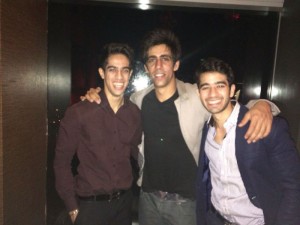 A Technological Rendition
A Technological Rendition
To put an end to people’s digital woes, Xyra’s XS powercard takes mobile technology to a whole new level. One of its founders, Armaan Gandhi, talks to Deepanshu Verma about his company’s new tech invention
WHAT DOES XYRA DO?
Launched by Arzan Irani, Armaan Gandhi and Sahej Sethi, Xyra is a tech startup that delivers new and existing technologies for the sole purpose of customer convenience and ease of use. Its first product, the XS powercard is a portable smartphone charger that also doubles up as a data storage device and a USB cable that conveniently fits into a wallet. With the launch of this product, Xyra made over $35,000 through pre-orders in just 50 days.
THE INSPIRATION
Of the inspiration behind the XS powercard Aramaan Gandhi says, “Smartphone battery life has been a major problem for users all around the globe. The idea to create this device came when one of our phones died while on a conference call.” Self-professed technophiles, the Xyra team always wanted to work together to solve a certain problem. Gandhi says their aim was to create a device that integrated seamlessly into the daily life of a user. After designing this portable charger, data storage device, and a USB cable, they came to realise that they could do more. “Your phone and wallet are two things you never leave without. Now, if you don’t forget your wallet, you won’t forget your XS powercard,” says Gandhi.
HURDLES ON THE WAY
The Xyra team faced communication and decision-making problems in the initial stages of production. Since three of them have never been in the same continent for more than three weeks, launching the product was quite a task. Their lack of experience in starting a business was also one of the hurdles; after all, it does take time to stand on your own feet in the risky realm of startups. What kept them going was faith in their idea and product.
TECHNOLOGICAL CHANGE
Gandhi believes that technology is evolving rapidly around the world and not just in India. He says that India produces some of the finest engineers that service the world, but ironically, it lags behind in adopting the technologies. Although slow, technology is catching up here.
THE FUTURE OF XYRA
“Technology will forever evolve to become faster, easier and wireless. Our idea bank includes ideas that include the above and are the future. If given the opportunity and if things work in our favour, we will definitely strive to bring them to life,” says Gandhi ethusiastically of the future of his business venture.
MY TAKE
I think the Xyra team has a very unique plan – to make technology convenient and easy to use. This unique plan is what makes them so special and different from other tech companies in the market. Along with the XS powercharger, they also aim to launch more such user-friendly products. It’s definitely a company to look out for.
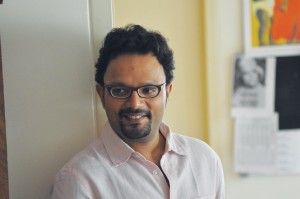 A Journalist new age
A Journalist new age
Raushan Kamdar finds out from awardwinningjournalist Gaurav Jain what it takes to be a writer in an era of information overload
WHO IS GAURAV JAIN?
Gaurav Jain is the journalist behind Tehelka magazine’s glorious investigative piece on the Aarushi Talwar murder. The House We Blew Down, published in 2011, won Jain a Mumbai Press Club Award for Excellence in Journalism.
TURNING TO JOURNALISM
Jain is an alumnus of the University of Pennsylvania, where he studied engineering and English literature. He then worked in business research and consulting in Washington, D.C for a few years. However, having always aspired to be a writer, Jain returned to India and eventually joined Tehelka, soon becoming its Literary Editor.
FINDING HIS FEET
As a beginner with no experience or formal training in journalism, Jain threw himself into deep sea. Ask him what he loves about his work and he cheerfully replies that working with some of the best writers in India is truly motivational for him, and his ceaseless need to inspire and be inspired keeps him on his toes.
INTO NEW TERRITORY
Jain and his friends captain two media ventures, Grist Media and TheLadiesFinger.com. Last summer he and his partner Nisha Susan launched a new section of Yahoo! News called Yahoo Originals through Grist Media. Originals publishes both analyses and on-ground reporting. They edit, curate and commission articles from India and the world. TheLadiesFinger is a new women’s webzine that promises fun commentaries and essays while retaining thoughtfulness.
VISION FOR CHANGE
Jain says that there is not enough scrutiny on media practices. Despite the vibrancy of Indian media, editors and journalists keep a code of silence and don’t usually criticise or examine each others’ practices and news reports. He is in favour of the British model of information and broadcasting where you build an identity of your media outlet by clearly stating your viewpoint. It wins the trust of the audience because you treat them as adults with a mind of their own, capable of discerning that what they consume from a media house or a journalist might be loaded with bias. In this competitive era, clear expression of ideologies is what it takes to build free and fair judgment.
WORD OF ADVICE
“One must possess the desire to read,” says Jain. In his opinion, it is important to read well in order to write well. Read anything well written – from good magazines to great blogs to the great classics. If you dislike reading, he says, you’ll probably never write well either.
MY TAKE
Gaurav Jain’s contribution to journalism is not just factual reportage of events as they unfold; he delves deeper to bring to the fore aspects and specifics that often remain unquestioned and thus unheard. He keeps the humane element of reportage afloat and therefore strikes a harmonious cord with readers. In keeping his texts literally affluent and emotionally upscale without compromising one bit on the impeccability of the details, Jain has indeed refined traditional journalism for the better.
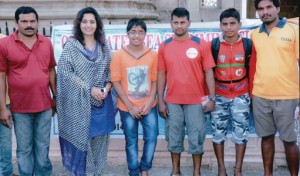 Swimmer Extraordinaire
Swimmer Extraordinaire
14-year-old Manav Mehta is a long-distance swimmer who has tamed the most torrid of waters in India. Arsh Gupta profiles this water baby
WHO IS MANAV MEHTA?
Manav, while not a student at Podar International School in Navi Mumbai, is a long-distance swimmer. He is coached by Kishore Patil and Santosh Patil, a record breaker in the US for long-distance swimming. Manav holds a national record and several state records.
TAKING TO THE WATERS
Manav began swimming at the age of five. He has since swum through rivers and seas. “I was really scared in my first event at sea,” he recalls. “I had to do it against the waves and the waters were very rough that day. I was literally shaking with fear.” He recently swam a whopping 36 km from Alibaug to the Gateway of India in six hours in the choppy waters of the Arabian Sea, breaking the national record. He says that swimming in the sea is far from easy since one needs to swim against the current, and when the weather is rough, it is tougher. “The water is very deep and there is always the chance of being carried away by the current.”
HURDLES ON THE WAY
Manav spends hours swimming, running and skipping to build his stamina. He was asked to leave his first swimming association when he opted for long-distance, as the association only trained swimmers for shorter distances. He had to alter his diet, control his intake of fatty foods and eat protein and carbohydrate-rich foods. He also had to (and still does) juggle between swimming and studies. At times, he says, he needs to sacrifice studies for practice.
SOME ACHIEVEMENTS
* Finished an 81-km swim in the Bhagirathi River, Kolkata; was also the youngest contestant to participate
* Swam 13 km from Uran to the Gateway of India in the Arabian Sea; broke a national record at just 8 years
* Swam 24 km from Karanja Jetty to Khanderi Island, becoming the first Indian to do so
VISION FOR CHANGE
Manav wants to create an organisation for young swimmers. “Organising events abroad and in India is very expensive. The government is not that helpful to promote rising stars of swimming and give them opportunities to perform at international events. Even excellent swimmers are not able to go abroad or to other cities because of economical and visa problems.” He would like to financially support such swimmers.
FUTURE PLANS
Manav aspires to represent India in the Commonwealth and Asian Games. He is, however, confused about his choice of career – either a doctor or a professional swimmer. “I wish to go into medical, but I can’t give up swimming.”
MY TAKE
Still in his early teens, Manav Mehta has made his place in the world of swimming. He is swimming unimaginable distances in deep sea waters and breaking national records. Excelling in freestyle and backstroke, he is one of the best swimmers in India. He is a worthy candidate for the Olympics and the Commonwealth Games and is already heading out for international open sea swimming events.
 The Noble Educator
The Noble Educator
Saasha Jethwani talks to Dhirendra Pratap Singh about teaching underprivileged kids through his educational endeavour Milaan
WHAT DOES MILAAN DO?
Milaan, from the words milan, meaning union, and elaan, meaning declaration, was founded by Dhirendra Pratap Singh. Milaan engages local communities, governments and the youth to join hands and build sustainable education models in areas and communities where India’s education infrastructure is lacking. In the last six years Milaan has worked with 10,000 children and young adults through various programmes and campaigns. Swarachna Learning and Resource Centre, its flagship programme in Uttar Pradesh currently provides education from kindergarten to class 12 to more than 500 students from economically and socially backward communities. Along with this, Milaan provides education, life skills and Dhirendra is an intelligent man who chose to follow his heart and work for change. His journey had struggles but they didn’t overshadow his dreams. People like him are role models not only because they do inspiring work, but also because they bring about a transformation. Undoubtedly, education will accelerate the development of our country and people like Dhirendra Pratap Singh will be the driving force behind it.
BIRTH OF MILAAN
Dhirendra’s aim is to educate children in the remote parts of the country enabling local youth to be catalysts for change. When he started out in 2007, he had to pick between choosing a lucrative career and following his dream of change. Even though he didn’t know much about the education industry, he knew he wanted to see change. Thus was born Milaan.
THE INSPIRATION
Dhirendra worked and lived in the rural village of Pitthorgrah for six months in 2007. He worked with a government school where he learned about the limitations of government education infrastructure. Instead of criticising it, he chose to understand their shortcomings and engage local youth to fill the gaps.
HURDLES ON THE WAY
The development sector is habituated to a certain way of functioning. Milaan being a youth-led initiative had difficulty in developing credibility
in the sector. They faced significant financial constrains and human resource issues too while starting out.
VISION FOR CHANGE
“I’d like young people in India to take charge of the present and the future,” says Dhirendra. Milaan propagates this thought while creating spaces to engage and enable the youth to be changemakers within their own communities.
FUTURE OF THE EDUCATION SECTOR
According to Dhirendra, the education sector needs to look into tangible partnerships between the government, local communities, NGOs and corporates to provide quality education across the length and the breadth of the country. Also, the youth need to look into the sector as a potential employer, creating space for them to grow as individuals while also contributing to the growth of India.
MY TAKE
Dhirendra is an intelligent man who chose to follow his heart and work for change. His journey had struggles but they didn’t overshadow his dreams. People like him are role models not only because they do inspiring work, but also because they bring about a transformation. Undoubtedly, education will accelerate the development of our country and people like Dhirendra Pratap Singh will be the driving force behind it.
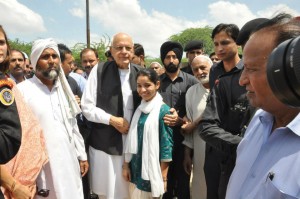 The Teen Changemaker
The Teen Changemaker
On learning about an easy-to-pedal solar powered riskshaw, 18-year-old Avani Singh stepped forward to change the lives of disadvantaged women by teaching them how to drive them. Shazia Sheikh tours the life of this young social worker
WHO IS AVANI SINGH?
At the tender age of 16, Avani Singh had the noble thought of making travel safe for women in New Delhi. With the help of solar powered vehicles, Avani set up Umeed, an organisation that facilitates transport for women, by women.
‘Umeed ki rickshaw,’ the organisation’s first initiative gave women from Delhi’s slums these unique battery operated rickshaws as a way to help them earn a living and become independent. First, Umeed selected five women, trained them to operate these rickshaws and then handed them driver’s licences. One of the first women to get hold of their licence was a 33-year-old single mother of three; she went on to become Delhi’s first woman rickshaw driver.
HER INSPIRATION
Avani would pass the slums close to her home every day on her way to school. The pitiful plight of the people from these slums frustrated her, which is why she enrolled as a volunteer for CEQUIN, an NGO that works towards the betterment of uncared for sections of the population. As she got involved with the women, she realised that many of them wanted to get out of the dire situations they were in. Soon after, she came across an article that introduced electric eco-friendly rickshaws in India. It occurred to her that the women she worked with could be trained to drive these vehicles and become economically self-sufficient.
HURDLES ON THE WAY
Starting her non-profit was not as easy as it seemed. Many different problems needed to be addressed. One such problem was the finance needed to procure these rickshaws. Each hurdle was crossed slowly and gradually, and the constant support of her parents and her team at Ummeed helped make her endeavour a success.
VISION FOR CHANGE
“Ummeed is only a small step in helping backward women. There are millions of such women, men and children that need help,” Avani says. However, she plans to expand the programme and help them overcome bigger hurdles. “We need millions of Ummeeds in our country. And so, I encourage everyone to contribute in whatever little way that they can, because each one of us can make a difference,” she adds.
FUTURE OF THE INDUSTRY
Along with teaching women to operate rickhaws, Avani’s aim is to also help enable women become bus drivers some day. She believes in working harder towards it while also working towards expanding the programme she initiated. She wants to help these economically and socially backward women earn a living with dignity and respect, which is possible only if youth today step forward and undertake such initiatives throughout the country.
MY TAKE
Avani, through her work has set an example for youth today. We, the youth are the future of our nation. If we don’t make an attempt to change things around us, then who will? Age, sex, class – none of it matters. You only have to be dedicated towards achieving a set goal. She was a 16 year-old school girl when she began Umeed, but still managed to make an impact on the lives of women. She is indeed an inspiration!
 The Medical Innovator
The Medical Innovator
25-year-old Anubhav Anusha, the brainchild behind NutraGene talks to Varsha Menon about his journey from being a science student to the owner of one of India’s first ever gene testing centres
WHAT IS NUTRAGENE?
NutraGene was formed out of the need to make genetic testing in India more accessible for disease prevention. With the help of NutraGene a person can diagnose diseases even before symptoms begin to show. NutraGene helps determine an individual’s susceptibility to diseases based on genetic and DNA testing. Additionally, NutraGene studies a patient’s responsiveness to drugs and analyses which foods, diets and weight loss regimens work for which people.
ANUBHAV ANUSHA, THE FOUNDER
With BSc and MSc degrees from Georgetown University, Anubhav Anusha started his career a healthcare investment banker after which he moved on to conduct cancer research at the Roswell Park Cancer Institute in Buffalo, New York. Anubhav describes his qualifications as being the best decisions he has taken, thus making him quite an inspiration.
THE INSPIRATION
“My father was diagnosed with heart disease at a young age. So the question of whether or not I will develop it was always on my mind,” says Anusha. When he found that genetic screening solutions for heart disease, diabetes and obesity were absent in our country, he came up with the concept of disease prevention based on DNA. Having previously worked with genetic screening companies in the USA, it was not very difficult to form a business model.
THE CHALLENGES
With a unique business venture and a low rate of awareness, Anubhav was plagued with the initial challenge of introducing his one-of -a-kind company to his audience. However, he believes that people in India have an open mind to new concepts but not everyone is willing to risk being the first to be tested on. “After approaching leading companies of preventive health and wellness in India and successfully convincing them, others followed,” he says proudly.
VISION FOR CHANGE
Anusha believes that the future of NutraGene is to extend genetic screening to the masses. He adds, “Everyone within the next five years will have his or her genetic information. Genetic screening is for all and not to be a luxury for a select few.”
FUTURE OF THE INDUSTRY
Everyone is faced with pressures from society to fit into traditional moulds. This innovator states that there are some people who choose the corporate path that is well-laid, whereas there are those who choose to risk what they have and ride rough waters on their own, motivated by a dream. Proudly stating that he is the latter kind, he reveals that his key to success is to manage risk and obviously have the right idea and motivation. “All I need in life is my family on my side, patience, persistence, and no task is unattainable,” Anusha signs off.
MY TAKE
With the evident amount of hard work and dedication to his goal, Anubhav Anusha proves that nothing is impossible. What really makes him an inspiration is the fact that he embodies a ‘never say die’ attitude taking on challenged head-on. All this just adds on to the brew of his admirable success.
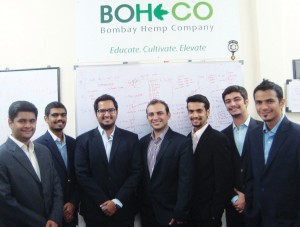 The Cannabis Revolution
The Cannabis Revolution
The Bombay Hemp Company, or BOHECO, is transforming the way hemp is being grown and used, find Nikhil Punjabi
WHAT IS BOHECO?
The Bombay Hemp Company is the first company in India to work with local industries and farmers to manufacture innovative agroproducts from industrial hemp. It was founded by a group of seven young entrepreneurs, or ‘agri-entrepreneurs’ as they like to call themselves: Avnish Pandya, Jahan Jamas, Sumit Shah, Delzaad Deolaliwala, Sanvar Oberoi, Chirag Tekchandaney and Yash Kotak.
WHAT DOES BOHECO DO?
BOHECO is involved all the way in the hemp business, from research to promotion. A man’s basic needs are food, clothing and shelter, and BOHECO is working to have hemp products figure among them. BOHECO produces hemp seeds which are high in nutrition, composed of 50% pure protein power, and hemp oil which is rich in omega 3 and omega 6 fatty acids. Both are under FDA testing. Shirts and t-shits which are 100% organic and made of hemp fibre are another offering. The company is also researching Bio-Crete, a plant-based building component – a mixture of hemp, hibiscus cannabis and a lime-based binder.
THE INSPIRATION
It all started in college, they say. The founders were part of a solar electrification project called Project Chirag for rural areas. They threw around some ideas on scaling up the initiative and aiding rural India in more sectors. On a vacation to Australia to visit his family, Jamas discovered the tremendous scope of hemp. He brought back his idea of using industrial hemp in manufacturing.
HURDLES ON THE WAY
BOHECO faced two major hurdles setting up – the first was the lack of knowledge about hemp in Indian communities. Hemp fibres and products are used in Himalayan regions but have never ventured beyond. The second was that facing a pioneer in the hemp manufacturing business, the legal system wasn’t entirely accommodating, given the laws against the cannabis plant (hemp is from the cannabis family – cannabis sativa; marijuana is cannabis indica). The founders needed to teach themselves the law and clear the legal roadblocks. The government, on the other hand, was always supportive of their initiative.
VISION FOR CHANGE
BOHECO’s mission is to educate the population with the benefits of hemp and other natural fibres, developing the cultivation process of crops along the way by elevating the standards of the farmers. It aims for ‘no compromise’, neither for the farmers nor for the consumers – farmers receive their minimum support price while consumers get products with the best quality at the best price. Through this it looks to create an entirely new industry, a new eco-system. With the help of modern science, BOHECO is attempting to develope the right seed and create a seed bank from varieties of hemp crop.
MY TAKE
India is in desperate need of companies that use natural resources to manufacture consumer products. Environment conservation is a serious issue and concrete steps must be taken in this regard. BOHECO’s initiative to educate, cultivate and elevate will serve as inspiration to other companies to promote natural fibres and provide support to farmers.
 Letting the Cause be the HERO
Letting the Cause be the HERO
Man of action Arun Krishnamurty talks to Nidhi Chokshi about his work as a conservationist and about his foundation, the Environment Foundation of India
WHO IS ARUN KRISHNAMURTHY?
Arun grew up in suburban Chennai amidst greenery and wildlife. But over time, expansions in the city took a toll on everything around him. Growing up he witnessed green meadows in his area turned into dusty fields and garbage dumps.
His initial step toward nature conversation came when a lake next to his house rich in biodiversity became heavily polluted and lead to a mosquito menace. The instance affected him so much that he sought help from a few of his friends and cleaned it. That was the beginning of his journey.
THE FIRST STEP
Krishnamurthy founded Environmental Foundation of India (EFI) after realising that vested interests and egos played major roles in the manner that NGOs worked. Out of the need to form an organisation that had volunteers work towards betterment without room for ulterior motives, he created EFI.
THE ENVIRONMENTAL FOUNDATION OF INDIA
EFI is a wildlife conservation and habitat restoration group working across several Indian cities. With a core team of 47 members from ages 10 to 22, conservation projects like the cleaning of lakes, introduction of animal centres and attempts to boost and restore biodiversity are taken up in full swing. The organisation also has plans to restore native Indian herbs and bring back the declining sparrow population.
HURDLES ON THE WAY
“Cleaning the lake has never been the problem; the issue has been making people understand the importance of protecting a lake,” says Krishnamurthy. With the help of documentary films and street theatre, EFI has tried to create public awareness about the environment.
Like most NGOs, EFI also faces revenue issues. Most of their money comes from the workshops they organise. However, Krishnamurthy proudly states that the challenges have groomed him to be a better conservationist and a person. Of his every day motivation he says, “Brave, young people doing something for the country is what keeps me going irrespective of the hardships.”
VISION FOR CHANGE
Krishnamurthy wishes that people become more aware and responsible about the world around them. He believes that people must live with the thought that the planet is shared with so many other life forms and that it is not just about them.
HOPEFUL FUTURE OF EFI
With a focus on structured diversification, EFI plans to restore and see the return of biodiversity in 29 lakes across Chennai, Coimbatore, Tanjore, Bangalore, Hyderabad and Shillong before the end of 2016. They also wish to create awareness while also effectively conserving India’s wildlife and their habitats. More importantly, EFI wants to continue to be that organisation where voluntary efforts will deliver results for all life forms.
MY TAKE
If what Arun and his team have already done isn’t enough, there is so much more he wishes to do for the country. Most importantly, he believes in the cause of his work rather than brag about what he has done so far. Apart from the concern he shows towards society and his drive for a better India, he is humble. He believes everyone is answerable to Mother Nature, even him, and hence he does his work with utmost sincerity. He is truly a star.
Volume 4 Issue 1





























